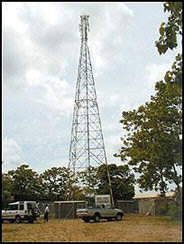 MODERNIZATION & PRIVATIZATION MODERNIZATION & PRIVATIZATION |
In an effort to increase the efficiency of public corporations, a massive privatization program was designed in 1996 to free the government of large capital expenses and liberalize Malawi’s economy. It was hoped that the private sector would create a competitive and modernized environment for growth.
"It is the private sector which has a competitive advantage," suggests Dye Mawindo, Executive Director of the Malawi Privatization Commission, "so the decision to divest various interests had four major objectives: the first was to increase efficiency, the second was to generate competition in the economy, the third was to enable Malawians to participate in the companies that were to be privatized, and the final goal was to raise revenues."
At present, approximately one hundred and forty public enterprises exist, and over 100 of these are being slated for privatization through the government’s divestiture sequence plan. Some of these entities will need to undergo a ‘commercialization’ process with a view to preparing them for privatization and ensuring greater operating efficiency.
Successful privatizations so far have included the sale of the Finance Corporation of Malawi (FINCOM) and Import and Export Malawi. However, now comes the difficult task of restructuring and privatizing the country’s major corporations, including Malawi Telecom, the Electricity Supply Corporation of Malawi (ESCOM) and the ailing national airline, Air Malawi.

| Infrastructure development will play a big role in the growth of Malawi, and with this in view the government is planning to update its telecommunications system. "Now we are looking at developing landlines" says Malewezi, "and here there are two approaches: Telecom Malawi is looking for a strategic partner, and we are also opening up the sector for competition". This strategy has helped increase phone services, and last year a second cellular operator, Celtel, entered the market under a 15-year license with a 5-year duopoly. The license allows for Celtel to provide voice, fax, data and other value-added services nationally throughout Malawi.
In the electricity sector, the privatization of ESCOM is being planned through a recently drafted Power Sector Policy Statement, which would transform ESCOM into a holding company with its generation, transmission and distribution assets being placed into separate limited liability companies. "Electricity needs long-term investment" stated Kaliyoma Phumisa , Minister of Commerce and Industry. "If there is electricity potential then we can create a more efficient and productive sector".
The financial sector has also seen important changes; liberalization policies have opened up the sector, banks owned by the government are being offered for sale to strategic partners, and foreign banks are entering the market as well. This has resulted in a more sophisticated financial market, with increased services such as merchant banking and e-commerce networking. "We want private investors to inject money into the banks in order to make the sector more competitive and therefore more effective" says Dr. Ellias Ngalande, Governor of the Reserve Bank of Malawi.
All in all, Malawi’s privatization program is certainly an ambitious one, and it will probably hit some difficult patches as the country’s state-owned companies go through a difficult modernization and streamlining process. Nevertheless, Mawindo is confident that things will go smoothly. "The foundations are in place, and we have established a strong framework to implement whatever is left to undertake" he asserted. "In five years time I hope that Malawi’s economy will mostly be transferred to private hands." |

